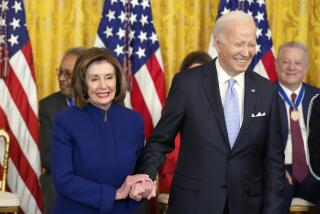Feinstein Leaves Open Option of Ground War
Breaking gently with President Clinton, U.S. Sen. Dianne Feinstein on Thursday opened the door to the use of American ground troops to bolster the impact of NATO airstrikes against Yugoslavia.
Responding to reporters’ questions after a Los Angeles speech, Feinstein was obliquely critical of the president’s public vow--which he reiterated Thursday--not to introduce U.S. forces onto Yugoslav soil.
“If we made all of these statements before World War II, we wouldn’t have won the war,” Feinstein said when asked if the administration had played its hand too publicly. “And so I think when you’re in it, you utilize surprise, unpredictability, different force options. And when you are in it, the military should run this.”
While optimistic about the bombing efforts of recent days, Feinstein said it is obvious that, so far, the airstrikes alone have not prevented Yugoslav President Slobodan Milosevic from assaulting Kosovo’s ethnic Albanians.
“They clearly haven’t halted it. And I think we have to be honest about that,” the California Democrat said. But, she added, Milosevic had paid “a penalty” for his actions.
Clinton has consistently refused to consider the use of ground troops, and he said so again Thursday during a news conference. He has held to that stance despite some national polls showing that the American public would support that escalation--and despite criticism from some military analysts that he has inappropriately signaled the boundaries of American involvement.
In her speech to several hundred members of the civic organization Town Hall, Feinstein did not address the subject of ground troops. And in her later responses to reporters, she was not advocating their introduction.
Yet she twice said the military must be able to exercise whatever options it concludes are necessary to break Milosevic’s hold on Kosovo.
The senator, who has never marched in lock-step with the administration, also suggested that hers is not necessarily the prevailing sentiment in the Senate. Had the use of ground troops been part of the equation when the Senate approved the concept of airstrikes last month, she said, “it wouldn’t have passed at that time.”
During the speech, Feinstein won forceful applause when she defended the administration’s decision to enter the Kosovo fray. She characterized U.S. action as strategically and morally necessary, and spoke of the delayed Western defense of Jews during World War II.
“The message must be this: The civilized world will never again do nothing in the face of genocide, ethnic cleansing, mass rape . . . and violence to thousands of innocent people,” Feinstein told her audience. “I strongly believe that our cause in Kosovo is just, and I believe that we must do what it takes to win. We must set the terms for a real and lasting peace in the region.”
Those attending the luncheon speech appeared to side with Feinstein. They not only applauded but also initially ignored the subject of Kosovo in the question-and-answer session that followed her speech. Only the fourth and last questioner challenged the senator’s statements by asking why Kosovo was strategically important to the U.S.
“Things like ethnic cleansing, if left unaddressed, filter into Macedonia, Albania, Turkey, Greece, all these countries, which then presents major problems,” Feinstein said. She added: “There’s a moral answer: If you’re the most powerful nation on Earth and you believe truly in democracy, how do you stand by and let this happen?”
More to Read
Get the L.A. Times Politics newsletter
Deeply reported insights into legislation, politics and policy from Sacramento, Washington and beyond. In your inbox three times per week.
You may occasionally receive promotional content from the Los Angeles Times.











